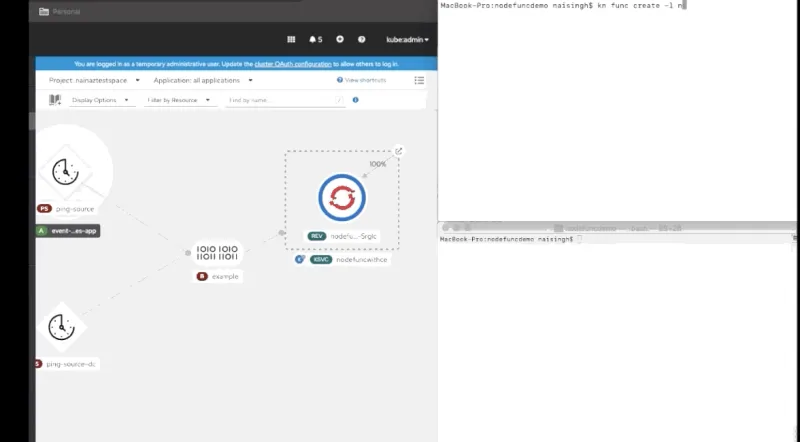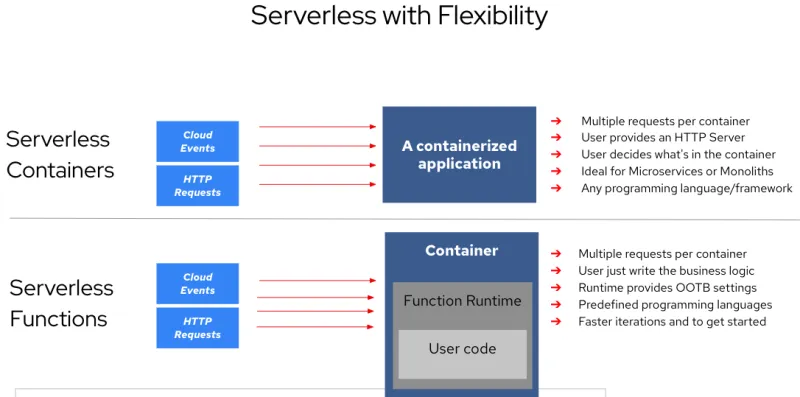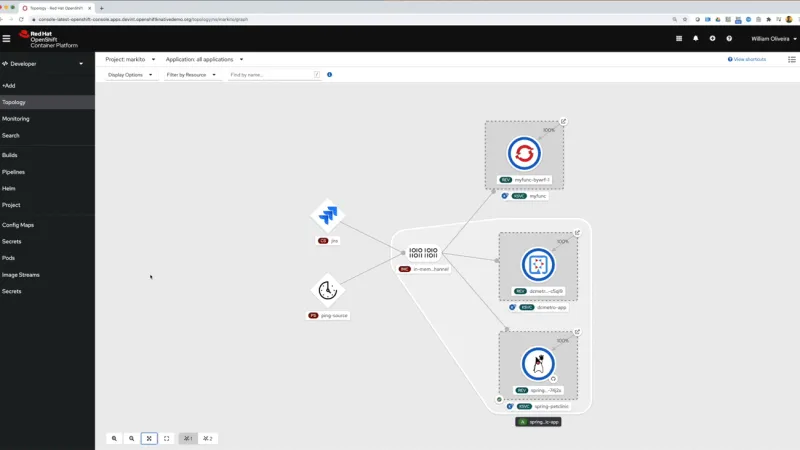We'd like to announce the latest release of OpenShift Serverless, version 1.14! This release targets, and is available for free, as part of OpenShift Container Platform 4.7 and 4.6.
Since our initial release, the adoption of serverless continues to grow and we see an uptick across several industries, especially around Financial Institutions, Telecommunications and Technology companies.
With Serverless the infrastructure is abstracted away from the app development process, meaning developers can focus on coding business logic and value into the business applications. Serverless also provides the auto-scaling of applications, meaning that business applications can easily scale up, down, and also to zero, meaning that these applications can dynamically meet the demand placed on them
The ability to scale these applications to zero when not in use has the added benefit of freeing up valuable compute resources on the underlying infrastructure.
Serverless 1.14 is based on the open-source project Knative version 0.20 and apart from adding Knative Kafka plugin to GA, brings several new features and experiences to OpenShift.
You can now build and deploy serverless computing on IBM Z and IBM LinuxONE with Red Hat OpenShift Serverless. This new offering is available as a no-charge add-on to the Red Hat OpenShift Container Platform.
As you architect new solutions, Eventing provides the capability to build event-driven applications that can connect to and from several systems running on-premises, on the cloud, and inside or outside of Kubernetes. With Knative Kafka plugin being GA with OpenShift Serverless 1.14 you can leverage the Eventing component to build true Event Driven serverless applications ready for production.
We recorded a short introduction to Eventing, you can watch it here. It enables powerful constructs such as:
- Event Sources, which connect to external systems and convert those from their native formats to Cloud Events, enabling greater portability and consistency across different infrastructure regardless of wherever those events originated from.
- Brokers, which can be used to connect multiple event sources and then route those events based on attributes, such as the event type, with a multi-tenant, more operationally-efficient model.
- Channels, which are useful when you have the same event type and want the same events to be processed by more than one application, and can help organizations move to event-driven microservices with easier management at scale.
This release includes Kafka Channel/Event Source as well as several event sources, powered by Camel-K (TP), such as AWS Kinesis, AWS SQS, Salesforce, Telegram, Slack, JIRA, alongside our built-in Event Sources (Kubernetes APIs, Ping, Kafka, and ContainerSource).

With the addition of Serverless functions (currently in Developer Preview), we are striving to complete the Serverless offering with all the necessary constructs developers need to build modern cloud-native applications. OpenShift Serverless functions OOTB runtimes include Quarkus, Node.js, Spring BootNew and Go, are based on the CNCF Buildpacks project. These functions can be invoked by plain HTTP Requests as well as Cloud Events to leverage the Eventing component. We call this Serverless with flexibility

Deploying your first serverless container is super-easy!

Integrations with OpenShift Service Mesh, OpenShift Pipelines, and many other platform features have also improved. You can, for example, "import a project from Git" and automatically have a Tekton pipeline created, simplifying your journey into Continuous Integration (CI) and automation.
Here is a recording for a more elaborated demo using OpenShift Pipelines, including Triggers, and Revisions.
These are just some of the highlights, you will find other features and more details as part of the release notes.
For more information:
- Website - OpenShift.com/serverless
- Introducing using OpenShift Serverless for event-driven applications
- Create your first OpenShift Serverless function
- Write a Quarkus function in two steps on OpenShift Serverless
- Product Documentation
- Knative Cookbook (Free E-book)
- Knative Tutorial by Red Hat Developers
- Katacoda Labs (using OCP 4.5)
- [video] Getting Started with Camel K - API and Knative
- [video] Event Streaming with Kafka on Knative Eventing
- [video] Event Streaming with Kafka on Knative Eventing
- [video] Quarkus function on OpenShift Serverless
About the author
Naina Singh joined Red Hat in 2018 and is currently the Principal Product Manager for Red Hat OpenShift Serverless.
More like this
Looking ahead to 2026: Red Hat’s view across the hybrid cloud
Red Hat to acquire Chatterbox Labs: Frequently Asked Questions
Crack the Cloud_Open | Command Line Heroes
Edge computing covered and diced | Technically Speaking
Browse by channel
Automation
The latest on IT automation for tech, teams, and environments
Artificial intelligence
Updates on the platforms that free customers to run AI workloads anywhere
Open hybrid cloud
Explore how we build a more flexible future with hybrid cloud
Security
The latest on how we reduce risks across environments and technologies
Edge computing
Updates on the platforms that simplify operations at the edge
Infrastructure
The latest on the world’s leading enterprise Linux platform
Applications
Inside our solutions to the toughest application challenges
Virtualization
The future of enterprise virtualization for your workloads on-premise or across clouds
